|
FreeRDP
|
#include <stdio.h>#include <stdlib.h>#include <string.h>#include <winpr/platform.h>#include <winpr/winpr.h>#include <winpr/wtypes.h>#include <winpr/error.h>#include <winpr/handle.h>#include <winpr/nt.h>Data Structures | |
| struct | RTL_CRITICAL_SECTION |
| struct | REASON_CONTEXT |
| struct | RTL_RUN_ONCE |
| struct | RTL_BARRIER |
Functions | |
| WINPR_API HANDLE | CreateMutexA (LPSECURITY_ATTRIBUTES lpMutexAttributes, BOOL bInitialOwner, LPCSTR lpName) |
| WINPR_API HANDLE | CreateMutexW (LPSECURITY_ATTRIBUTES lpMutexAttributes, BOOL bInitialOwner, LPCWSTR lpName) |
| WINPR_API HANDLE | CreateMutexExA (LPSECURITY_ATTRIBUTES lpMutexAttributes, LPCSTR lpName, DWORD dwFlags, DWORD dwDesiredAccess) |
| WINPR_API HANDLE | CreateMutexExW (LPSECURITY_ATTRIBUTES lpMutexAttributes, LPCWSTR lpName, DWORD dwFlags, DWORD dwDesiredAccess) |
| WINPR_API HANDLE | OpenMutexA (DWORD dwDesiredAccess, BOOL bInheritHandle, LPCSTR lpName) |
| WINPR_API HANDLE | OpenMutexW (DWORD dwDesiredAccess, BOOL bInheritHandle, LPCWSTR lpName) |
| WINPR_API BOOL | ReleaseMutex (HANDLE hMutex) |
| WINPR_API HANDLE | CreateSemaphoreA (LPSECURITY_ATTRIBUTES lpSemaphoreAttributes, LONG lInitialCount, LONG lMaximumCount, LPCSTR lpName) |
| WINPR_API HANDLE | CreateSemaphoreW (LPSECURITY_ATTRIBUTES lpSemaphoreAttributes, LONG lInitialCount, LONG lMaximumCount, LPCWSTR lpName) |
| WINPR_API HANDLE | OpenSemaphoreA (DWORD dwDesiredAccess, BOOL bInheritHandle, LPCSTR lpName) |
| WINPR_API HANDLE | OpenSemaphoreW (DWORD dwDesiredAccess, BOOL bInheritHandle, LPCWSTR lpName) |
| WINPR_API BOOL | ReleaseSemaphore (HANDLE hSemaphore, LONG lReleaseCount, LPLONG lpPreviousCount) |
| WINPR_API HANDLE | CreateEventA (LPSECURITY_ATTRIBUTES lpEventAttributes, BOOL bManualReset, BOOL bInitialState, LPCSTR lpName) |
| WINPR_API HANDLE | CreateEventW (LPSECURITY_ATTRIBUTES lpEventAttributes, BOOL bManualReset, BOOL bInitialState, LPCWSTR lpName) |
| WINPR_API HANDLE | CreateEventExA (LPSECURITY_ATTRIBUTES lpEventAttributes, LPCSTR lpName, DWORD dwFlags, DWORD dwDesiredAccess) |
| WINPR_API HANDLE | CreateEventExW (LPSECURITY_ATTRIBUTES lpEventAttributes, LPCWSTR lpName, DWORD dwFlags, DWORD dwDesiredAccess) |
| WINPR_API HANDLE | OpenEventA (DWORD dwDesiredAccess, BOOL bInheritHandle, LPCSTR lpName) |
| WINPR_API HANDLE | OpenEventW (DWORD dwDesiredAccess, BOOL bInheritHandle, LPCWSTR lpName) |
| WINPR_API BOOL | SetEvent (HANDLE hEvent) |
| WINPR_API BOOL | ResetEvent (HANDLE hEvent) |
| WINPR_API VOID | InitializeCriticalSection (LPCRITICAL_SECTION lpCriticalSection) |
| WINPR_API BOOL | InitializeCriticalSectionEx (LPCRITICAL_SECTION lpCriticalSection, DWORD dwSpinCount, DWORD Flags) |
| WINPR_API BOOL | InitializeCriticalSectionAndSpinCount (LPCRITICAL_SECTION lpCriticalSection, DWORD dwSpinCount) |
| WINPR_API DWORD | SetCriticalSectionSpinCount (LPCRITICAL_SECTION lpCriticalSection, DWORD dwSpinCount) |
| WINPR_API VOID | EnterCriticalSection (LPCRITICAL_SECTION lpCriticalSection) |
| WINPR_API BOOL | TryEnterCriticalSection (LPCRITICAL_SECTION lpCriticalSection) |
| WINPR_API VOID | LeaveCriticalSection (LPCRITICAL_SECTION lpCriticalSection) |
| WINPR_API VOID | DeleteCriticalSection (LPCRITICAL_SECTION lpCriticalSection) |
| WINPR_API VOID | Sleep (DWORD dwMilliseconds) |
| WINPR_API DWORD | SleepEx (DWORD dwMilliseconds, BOOL bAlertable) |
| WINPR_API VOID | WakeByAddressAll (PVOID Address) |
| WINPR_API VOID | WakeByAddressSingle (PVOID Address) |
| WINPR_API BOOL | WaitOnAddress (VOID volatile *Address, PVOID CompareAddress, SIZE_T AddressSize, DWORD dwMilliseconds) |
| WINPR_API DWORD | WaitForSingleObject (HANDLE hHandle, DWORD dwMilliseconds) |
| WINPR_API DWORD | WaitForSingleObjectEx (HANDLE hHandle, DWORD dwMilliseconds, BOOL bAlertable) |
| WINPR_API DWORD | WaitForMultipleObjects (DWORD nCount, const HANDLE *lpHandles, BOOL bWaitAll, DWORD dwMilliseconds) |
| WINPR_API DWORD | WaitForMultipleObjectsEx (DWORD nCount, const HANDLE *lpHandles, BOOL bWaitAll, DWORD dwMilliseconds, BOOL bAlertable) |
| WINPR_API DWORD | SignalObjectAndWait (HANDLE hObjectToSignal, HANDLE hObjectToWaitOn, DWORD dwMilliseconds, BOOL bAlertable) |
| WINPR_API HANDLE | CreateWaitableTimerA (LPSECURITY_ATTRIBUTES lpTimerAttributes, BOOL bManualReset, LPCSTR lpTimerName) |
| WINPR_API HANDLE | CreateWaitableTimerW (LPSECURITY_ATTRIBUTES lpTimerAttributes, BOOL bManualReset, LPCWSTR lpTimerName) |
| WINPR_API HANDLE | CreateWaitableTimerExA (LPSECURITY_ATTRIBUTES lpTimerAttributes, LPCSTR lpTimerName, DWORD dwFlags, DWORD dwDesiredAccess) |
| WINPR_API HANDLE | CreateWaitableTimerExW (LPSECURITY_ATTRIBUTES lpTimerAttributes, LPCWSTR lpTimerName, DWORD dwFlags, DWORD dwDesiredAccess) |
| WINPR_API BOOL | SetWaitableTimer (HANDLE hTimer, const LARGE_INTEGER *lpDueTime, LONG lPeriod, PTIMERAPCROUTINE pfnCompletionRoutine, LPVOID lpArgToCompletionRoutine, BOOL fResume) |
| WINPR_API BOOL | SetWaitableTimerEx (HANDLE hTimer, const LARGE_INTEGER *lpDueTime, LONG lPeriod, PTIMERAPCROUTINE pfnCompletionRoutine, LPVOID lpArgToCompletionRoutine, PREASON_CONTEXT WakeContext, ULONG TolerableDelay) |
| WINPR_API HANDLE | OpenWaitableTimerA (DWORD dwDesiredAccess, BOOL bInheritHandle, LPCSTR lpTimerName) |
| WINPR_API HANDLE | OpenWaitableTimerW (DWORD dwDesiredAccess, BOOL bInheritHandle, LPCWSTR lpTimerName) |
| WINPR_API BOOL | CancelWaitableTimer (HANDLE hTimer) |
| WINPR_API int | GetTimerFileDescriptor (HANDLE hEvent) |
| WINPR_API HANDLE | CreateTimerQueue (void) |
| WINPR_API BOOL | DeleteTimerQueue (HANDLE TimerQueue) |
| WINPR_API BOOL | DeleteTimerQueueEx (HANDLE TimerQueue, HANDLE CompletionEvent) |
| WINPR_API BOOL | CreateTimerQueueTimer (PHANDLE phNewTimer, HANDLE TimerQueue, WAITORTIMERCALLBACK Callback, PVOID Parameter, DWORD DueTime, DWORD Period, ULONG Flags) |
| WINPR_API BOOL | ChangeTimerQueueTimer (HANDLE TimerQueue, HANDLE Timer, ULONG DueTime, ULONG Period) |
| WINPR_API BOOL | DeleteTimerQueueTimer (HANDLE TimerQueue, HANDLE Timer, HANDLE CompletionEvent) |
| WINPR_API BOOL | winpr_InitOnceBeginInitialize (LPINIT_ONCE lpInitOnce, DWORD dwFlags, PBOOL fPending, LPVOID *lpContext) |
| WINPR_API BOOL | winpr_InitOnceComplete (LPINIT_ONCE lpInitOnce, DWORD dwFlags, LPVOID lpContext) |
| WINPR_API BOOL | winpr_InitOnceExecuteOnce (PINIT_ONCE InitOnce, PINIT_ONCE_FN InitFn, PVOID Parameter, LPVOID *Context) |
| WINPR_API VOID | winpr_InitOnceInitialize (PINIT_ONCE InitOnce) |
| WINPR_API BOOL WINAPI | winpr_InitializeSynchronizationBarrier (LPSYNCHRONIZATION_BARRIER lpBarrier, LONG lTotalThreads, LONG lSpinCount) |
| WINPR_API BOOL WINAPI | winpr_EnterSynchronizationBarrier (LPSYNCHRONIZATION_BARRIER lpBarrier, DWORD dwFlags) |
| WINPR_API BOOL WINAPI | winpr_DeleteSynchronizationBarrier (LPSYNCHRONIZATION_BARRIER lpBarrier) |
| WINPR_API VOID | USleep (DWORD dwMicroseconds) |
| WINPR_API HANDLE | CreateFileDescriptorEventW (LPSECURITY_ATTRIBUTES lpEventAttributes, BOOL bManualReset, BOOL bInitialState, int FileDescriptor, ULONG mode) |
| WINPR_API HANDLE | CreateFileDescriptorEventA (LPSECURITY_ATTRIBUTES lpEventAttributes, BOOL bManualReset, BOOL bInitialState, int FileDescriptor, ULONG mode) |
| WINPR_API HANDLE | CreateWaitObjectEvent (LPSECURITY_ATTRIBUTES lpEventAttributes, BOOL bManualReset, BOOL bInitialState, void *pObject) |
| WINPR_API int | GetEventFileDescriptor (HANDLE hEvent) |
| WINPR_API int | SetEventFileDescriptor (HANDLE hEvent, int FileDescriptor, ULONG mode) |
| WINPR_API void * | GetEventWaitObject (HANDLE hEvent) |
| #define _RTL_RUN_ONCE_DEF |
| #define CREATE_EVENT_INITIAL_SET 0x00000002 |
| #define CREATE_EVENT_MANUAL_RESET 0x00000001 |
| #define CREATE_MUTEX_INITIAL_OWNER 0x00000001 |
WinPR: Windows Portable Runtime Synchronization Functions
Copyright 2012 Marc-Andre Moreau marcandre.moreau@gmail.com Copyright 2014 Thincast Technologies GmbH Copyright 2014 Norbert Federa norbert.federa@thincast.com
Licensed under the Apache License, Version 2.0 (the "License"); you may not use this file except in compliance with the License. You may obtain a copy of the License at
http://www.apache.org/licenses/LICENSE-2.0
Unless required by applicable law or agreed to in writing, software distributed under the License is distributed on an "AS IS" BASIS, WITHOUT WARRANTIES OR CONDITIONS OF ANY KIND, either express or implied. See the License for the specific language governing permissions and limitations under the License.
| #define CREATE_WAITABLE_TIMER_MANUAL_RESET 0x00000001 |
| #define CreateEvent CreateEventA |
| #define CreateEventEx CreateEventExA |
| #define CreateFileDescriptorEvent CreateFileDescriptorEventA |
| #define CreateMutex CreateMutexA |
| #define CreateMutexEx CreateMutexExA |
| #define CreateSemaphore CreateSemaphoreA |
| #define CreateWaitableTimer CreateWaitableTimerA |
| #define CreateWaitableTimerEx CreateWaitableTimerExA |
| #define DeleteSynchronizationBarrier winpr_DeleteSynchronizationBarrier |
| #define EnterSynchronizationBarrier winpr_EnterSynchronizationBarrier |
| #define INFINITE 0xFFFFFFFFUL |
| #define INIT_ONCE_STATIC_INIT RTL_RUN_ONCE_INIT |
| #define InitializeSynchronizationBarrier winpr_InitializeSynchronizationBarrier |
| #define InitOnceBeginInitialize winpr_InitOnceBeginInitialize |
| #define InitOnceComplete winpr_InitOnceComplete |
| #define InitOnceExecuteOnce winpr_InitOnceExecuteOnce |
| #define InitOnceInitialize winpr_InitOnceInitialize |
| #define MAXIMUM_WAIT_OBJECTS 64 |
| #define OpenEvent OpenEventA |
| #define OpenMutex OpenMutexA |
| #define OpenSemaphore OpenSemaphoreA |
| #define OpenWaitableTimer OpenWaitableTimerA |
| #define RTL_RUN_ONCE_ASYNC 0x00000002 |
| #define RTL_RUN_ONCE_CHECK_ONLY 0x00000001 |
| #define RTL_RUN_ONCE_CTX_RESERVED_BITS 2 |
| #define RTL_RUN_ONCE_INIT |
| #define RTL_RUN_ONCE_INIT_FAILED 0x00000004 |
| #define SYNCHRONIZATION_BARRIER_FLAGS_BLOCK_ONLY 0x02 |
| #define SYNCHRONIZATION_BARRIER_FLAGS_NO_DELETE 0x04 |
| #define SYNCHRONIZATION_BARRIER_FLAGS_SPIN_ONLY 0x01 |
| #define WAIT_ABANDONED 0x00000080UL |
| #define WAIT_FAILED 0xFFFFFFFFUL |
| #define WAIT_IO_COMPLETION 0x000000C0UL |
| #define WAIT_OBJECT_0 0x00000000UL |
| #define WAIT_TIMEOUT 0x00000102UL |
| #define WINPR_SYNCHRONIZATION_BARRIER 1 |
| #define WT_EXECUTEDEFAULT 0x00000000 |
Timer-Queue Timer
| #define WT_EXECUTEINIOTHREAD 0x00000001 |
| #define WT_EXECUTEINPERSISTENTIOTHREAD 0x00000040 |
| #define WT_EXECUTEINPERSISTENTTHREAD 0x00000080 |
| #define WT_EXECUTEINTIMERTHREAD 0x00000020 |
| #define WT_EXECUTEINUITHREAD 0x00000002 |
| #define WT_EXECUTEINWAITTHREAD 0x00000004 |
| #define WT_EXECUTELONGFUNCTION 0x00000010 |
| #define WT_EXECUTEONLYONCE 0x00000008 |
| #define WT_TRANSFER_IMPERSONATION 0x00000100 |
| typedef RTL_CRITICAL_SECTION CRITICAL_SECTION |
| typedef RTL_RUN_ONCE INIT_ONCE |
| typedef PRTL_RUN_ONCE LPINIT_ONCE |
| typedef RTL_CONDITION_VARIABLE * PCONDITION_VARIABLE |
| typedef PRTL_RUN_ONCE PINIT_ONCE |
| typedef BOOL(CALLBACK* PINIT_ONCE_FN) (PINIT_ONCE InitOnce, PVOID Parameter, PVOID *Context) |
| typedef struct REASON_CONTEXT * PREASON_CONTEXT |
| typedef struct RTL_BARRIER * PRTL_BARRIER |
| typedef struct RTL_CRITICAL_SECTION * PRTL_CRITICAL_SECTION |
| typedef struct RTL_RUN_ONCE * PRTL_RUN_ONCE |
| typedef PRTL_BARRIER PSYNCHRONIZATION_BARRIER |
| typedef VOID(* PTIMERAPCROUTINE) (LPVOID lpArgToCompletionRoutine, DWORD dwTimerLowValue, DWORD dwTimerHighValue) |
| typedef PVOID RTL_CONDITION_VARIABLE |
| typedef ULONG CALLBACK RTL_RUN_ONCE_INIT_FN(PRTL_RUN_ONCE RunOnce, PVOID Parameter, PVOID *Context) |
| typedef RTL_BARRIER SYNCHRONIZATION_BARRIER |
| typedef VOID(* WAITORTIMERCALLBACK) (PVOID lpParameter, BOOLEAN TimerOrWaitFired) |
| WINPR_API BOOL CancelWaitableTimer | ( | HANDLE | hTimer | ) |

| WINPR_API BOOL ChangeTimerQueueTimer | ( | HANDLE | TimerQueue, |
| HANDLE | Timer, | ||
| ULONG | DueTime, | ||
| ULONG | Period | ||
| ) |

| WINPR_API HANDLE CreateEventA | ( | LPSECURITY_ATTRIBUTES | lpEventAttributes, |
| BOOL | bManualReset, | ||
| BOOL | bInitialState, | ||
| LPCSTR | lpName | ||
| ) |
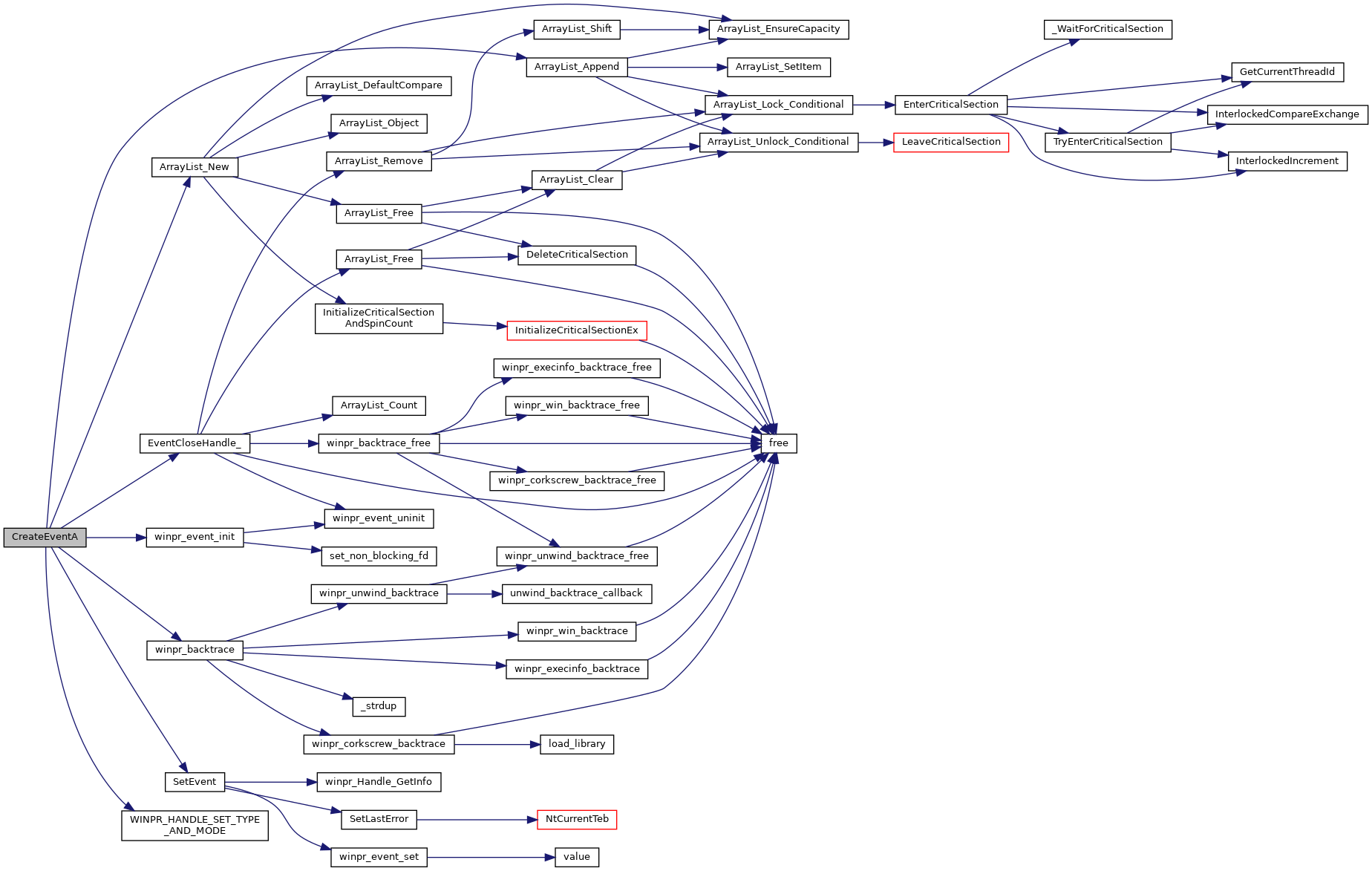

| WINPR_API HANDLE CreateEventExA | ( | LPSECURITY_ATTRIBUTES | lpEventAttributes, |
| LPCSTR | lpName, | ||
| DWORD | dwFlags, | ||
| DWORD | dwDesiredAccess | ||
| ) |
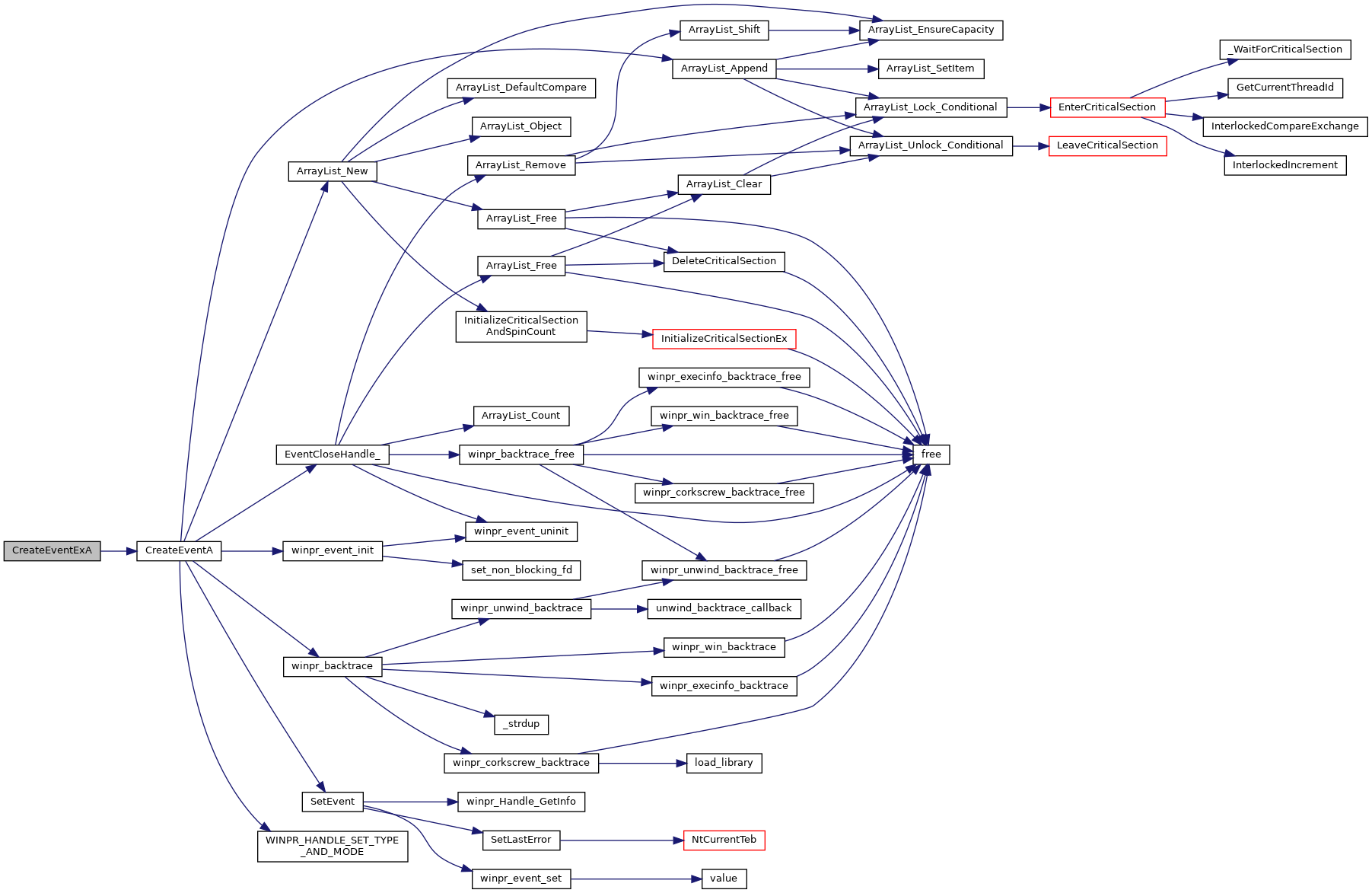
| WINPR_API HANDLE CreateEventExW | ( | LPSECURITY_ATTRIBUTES | lpEventAttributes, |
| LPCWSTR | lpName, | ||
| DWORD | dwFlags, | ||
| DWORD | dwDesiredAccess | ||
| ) |
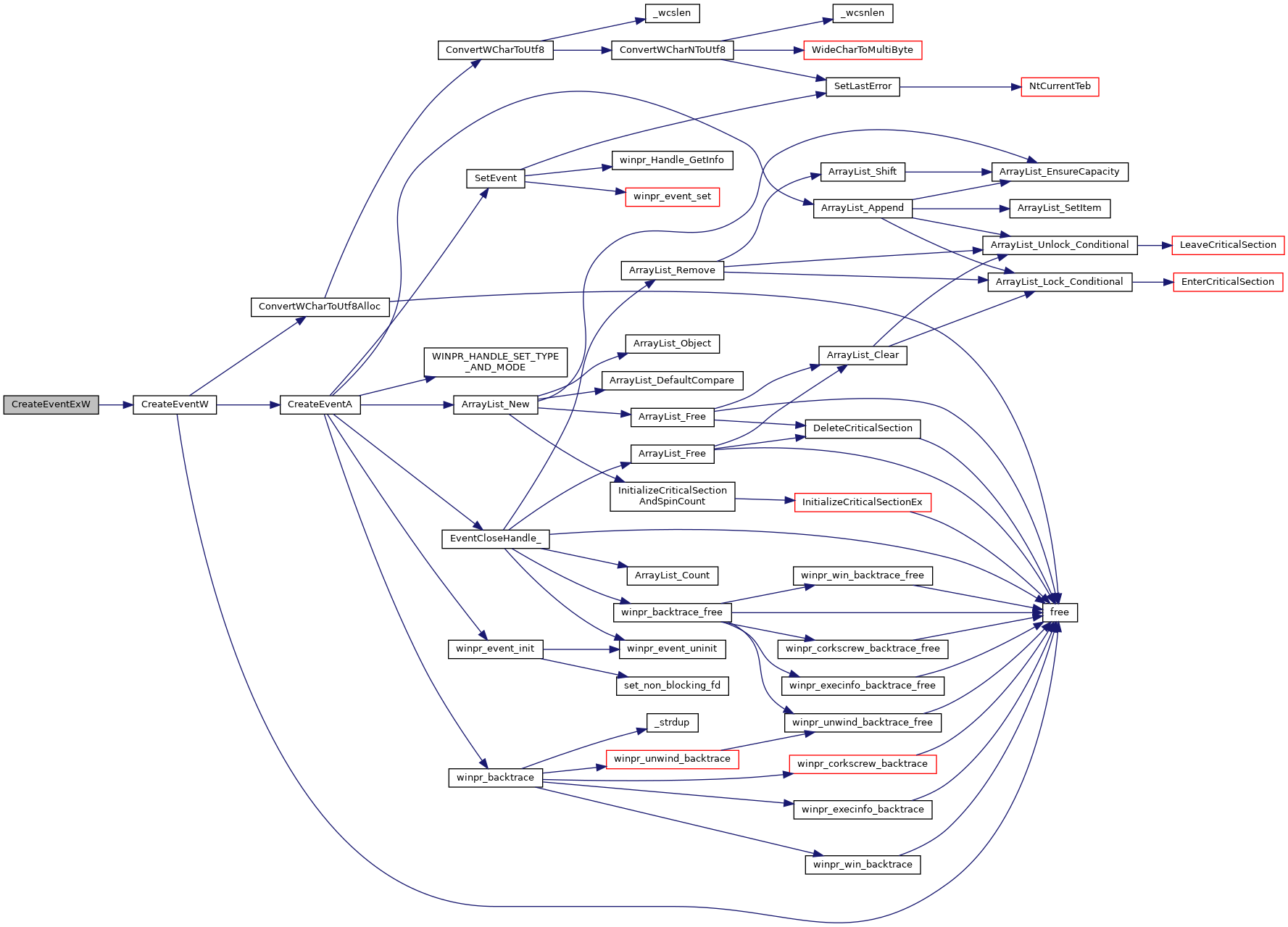
| WINPR_API HANDLE CreateEventW | ( | LPSECURITY_ATTRIBUTES | lpEventAttributes, |
| BOOL | bManualReset, | ||
| BOOL | bInitialState, | ||
| LPCWSTR | lpName | ||
| ) |
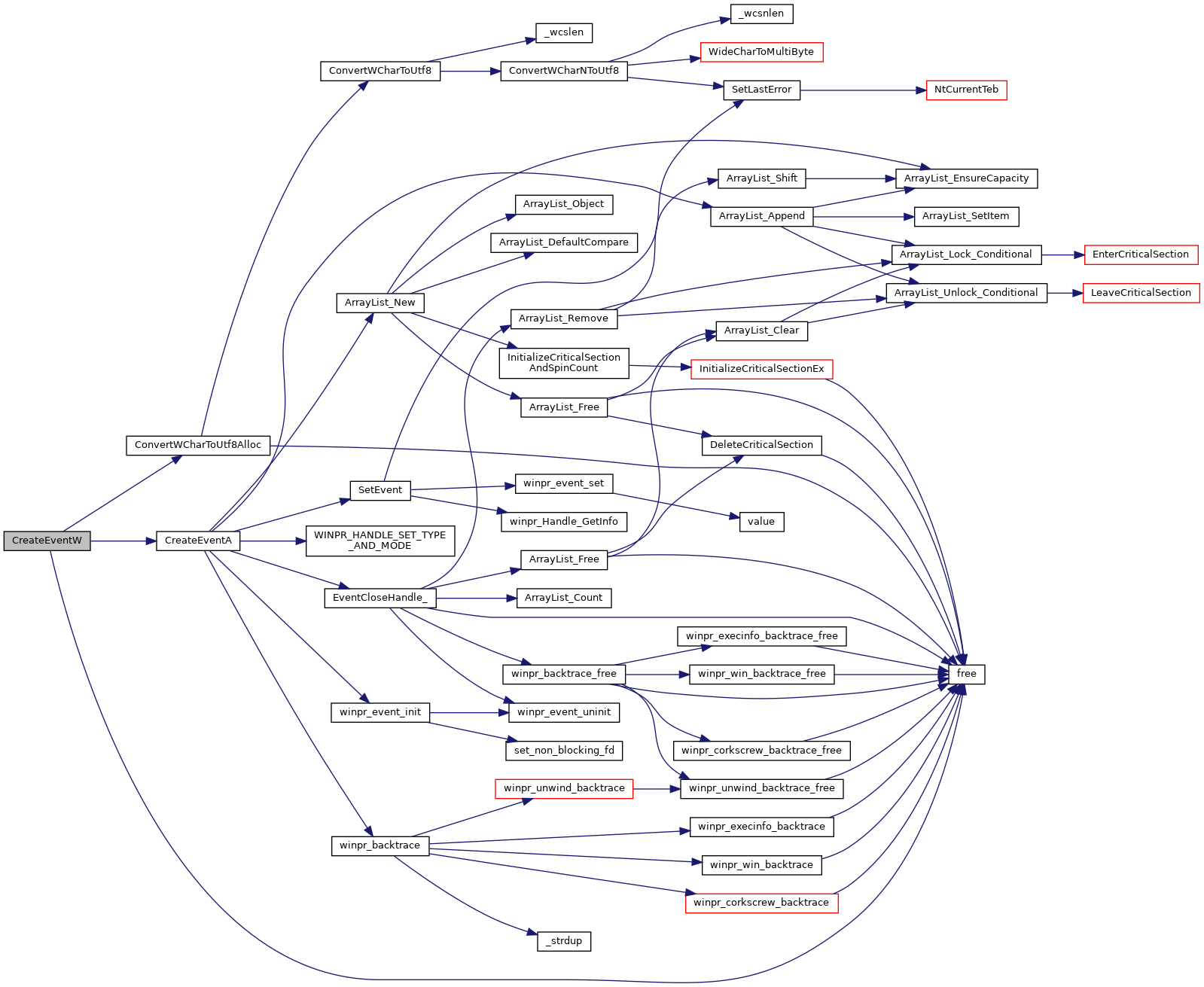

| WINPR_API HANDLE CreateFileDescriptorEventA | ( | LPSECURITY_ATTRIBUTES | lpEventAttributes, |
| BOOL | bManualReset, | ||
| BOOL | bInitialState, | ||
| int | FileDescriptor, | ||
| ULONG | mode | ||
| ) |

| WINPR_API HANDLE CreateFileDescriptorEventW | ( | LPSECURITY_ATTRIBUTES | lpEventAttributes, |
| BOOL | bManualReset, | ||
| BOOL | bInitialState, | ||
| int | FileDescriptor, | ||
| ULONG | mode | ||
| ) |


| WINPR_API HANDLE CreateMutexA | ( | LPSECURITY_ATTRIBUTES | lpMutexAttributes, |
| BOOL | bInitialOwner, | ||
| LPCSTR | lpName | ||
| ) |


| WINPR_API HANDLE CreateMutexExA | ( | LPSECURITY_ATTRIBUTES | lpMutexAttributes, |
| LPCSTR | lpName, | ||
| DWORD | dwFlags, | ||
| DWORD | dwDesiredAccess | ||
| ) |

| WINPR_API HANDLE CreateMutexExW | ( | LPSECURITY_ATTRIBUTES | lpMutexAttributes, |
| LPCWSTR | lpName, | ||
| DWORD | dwFlags, | ||
| DWORD | dwDesiredAccess | ||
| ) |

| WINPR_API HANDLE CreateMutexW | ( | LPSECURITY_ATTRIBUTES | lpMutexAttributes, |
| BOOL | bInitialOwner, | ||
| LPCWSTR | lpName | ||
| ) |


| WINPR_API HANDLE CreateSemaphoreA | ( | LPSECURITY_ATTRIBUTES | lpSemaphoreAttributes, |
| LONG | lInitialCount, | ||
| LONG | lMaximumCount, | ||
| LPCSTR | lpName | ||
| ) |

| WINPR_API HANDLE CreateSemaphoreW | ( | LPSECURITY_ATTRIBUTES | lpSemaphoreAttributes, |
| LONG | lInitialCount, | ||
| LONG | lMaximumCount, | ||
| LPCWSTR | lpName | ||
| ) |


| WINPR_API HANDLE CreateTimerQueue | ( | void | ) |


| WINPR_API BOOL CreateTimerQueueTimer | ( | PHANDLE | phNewTimer, |
| HANDLE | TimerQueue, | ||
| WAITORTIMERCALLBACK | Callback, | ||
| PVOID | Parameter, | ||
| DWORD | DueTime, | ||
| DWORD | Period, | ||
| ULONG | Flags | ||
| ) |


| WINPR_API HANDLE CreateWaitableTimerA | ( | LPSECURITY_ATTRIBUTES | lpTimerAttributes, |
| BOOL | bManualReset, | ||
| LPCSTR | lpTimerName | ||
| ) |
Waitable Timer


| WINPR_API HANDLE CreateWaitableTimerExA | ( | LPSECURITY_ATTRIBUTES | lpTimerAttributes, |
| LPCSTR | lpTimerName, | ||
| DWORD | dwFlags, | ||
| DWORD | dwDesiredAccess | ||
| ) |


| WINPR_API HANDLE CreateWaitableTimerExW | ( | LPSECURITY_ATTRIBUTES | lpTimerAttributes, |
| LPCWSTR | lpTimerName, | ||
| DWORD | dwFlags, | ||
| DWORD | dwDesiredAccess | ||
| ) |

| WINPR_API HANDLE CreateWaitableTimerW | ( | LPSECURITY_ATTRIBUTES | lpTimerAttributes, |
| BOOL | bManualReset, | ||
| LPCWSTR | lpTimerName | ||
| ) |

| WINPR_API HANDLE CreateWaitObjectEvent | ( | LPSECURITY_ATTRIBUTES | lpEventAttributes, |
| BOOL | bManualReset, | ||
| BOOL | bInitialState, | ||
| void * | pObject | ||
| ) |
Returns an event based on the handle returned by GetEventWaitObject()


| WINPR_API VOID DeleteCriticalSection | ( | LPCRITICAL_SECTION | lpCriticalSection | ) |
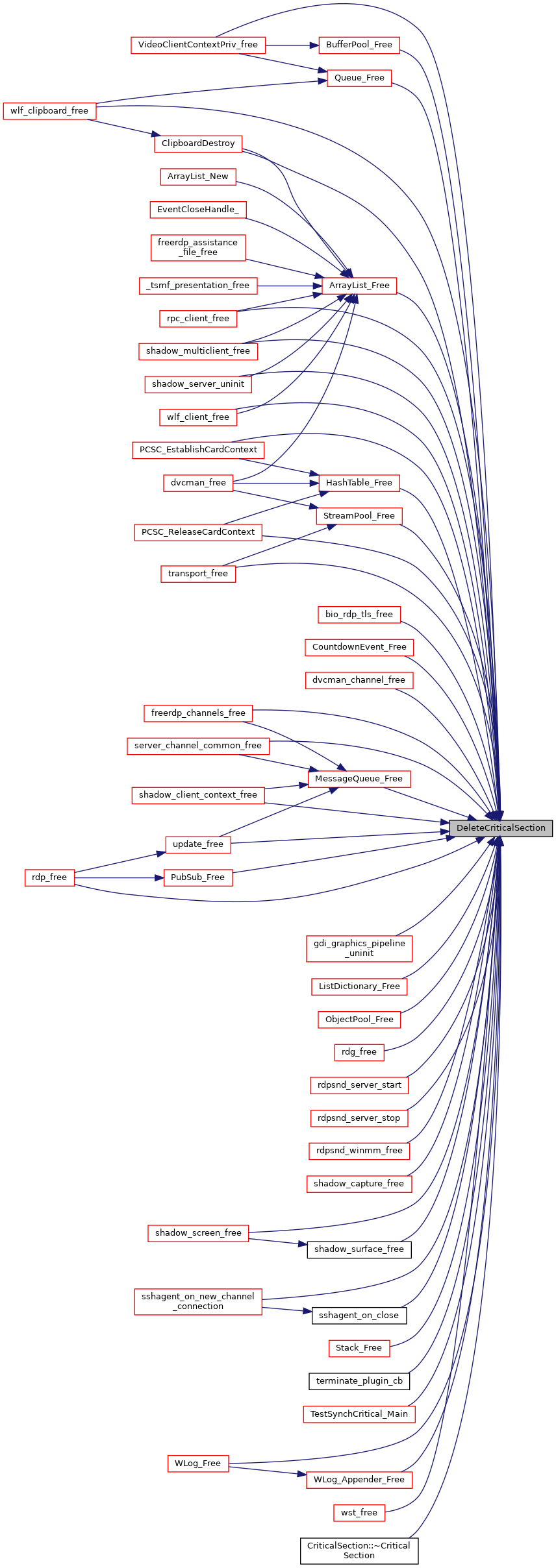
| WINPR_API BOOL DeleteTimerQueue | ( | HANDLE | TimerQueue | ) |


| WINPR_API BOOL DeleteTimerQueueEx | ( | HANDLE | TimerQueue, |
| HANDLE | CompletionEvent | ||
| ) |
Quote from MSDN regarding CompletionEvent: If this parameter is INVALID_HANDLE_VALUE, the function waits for all callback functions to complete before returning. If this parameter is NULL, the function marks the timer for deletion and returns immediately.
Note: The current WinPR implementation implicitly waits for any callback functions to complete (see pthread_join above)


| WINPR_API BOOL DeleteTimerQueueTimer | ( | HANDLE | TimerQueue, |
| HANDLE | Timer, | ||
| HANDLE | CompletionEvent | ||
| ) |
Quote from MSDN regarding CompletionEvent: If this parameter is INVALID_HANDLE_VALUE, the function waits for all callback functions to complete before returning. If this parameter is NULL, the function marks the timer for deletion and returns immediately.
Note: The current WinPR implementation implicitly waits for any callback functions to complete (see cond_mutex usage)


| WINPR_API VOID EnterCriticalSection | ( | LPCRITICAL_SECTION | lpCriticalSection | ) |
On some operating systems sched_yield is a stub. usleep should at least trigger a context switch if any thread is waiting. A ThreadYield() would be nice in winpr ...
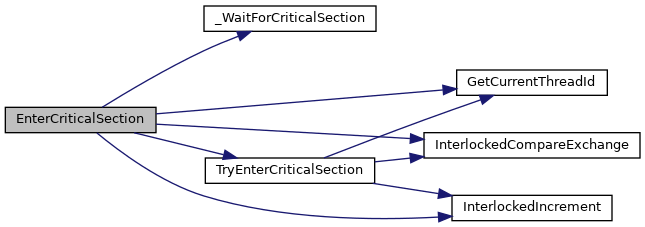
| WINPR_API int GetEventFileDescriptor | ( | HANDLE | hEvent | ) |


| WINPR_API void* GetEventWaitObject | ( | HANDLE | hEvent | ) |
Returns platform-specific wait object as a void pointer
On Windows, the returned object is the same as the hEvent argument and is an event HANDLE usable in WaitForMultipleObjects
On other platforms, the returned object can be cast to an int to obtain a file descriptor usable in select()


| WINPR_API int GetTimerFileDescriptor | ( | HANDLE | hEvent | ) |

| WINPR_API VOID InitializeCriticalSection | ( | LPCRITICAL_SECTION | lpCriticalSection | ) |

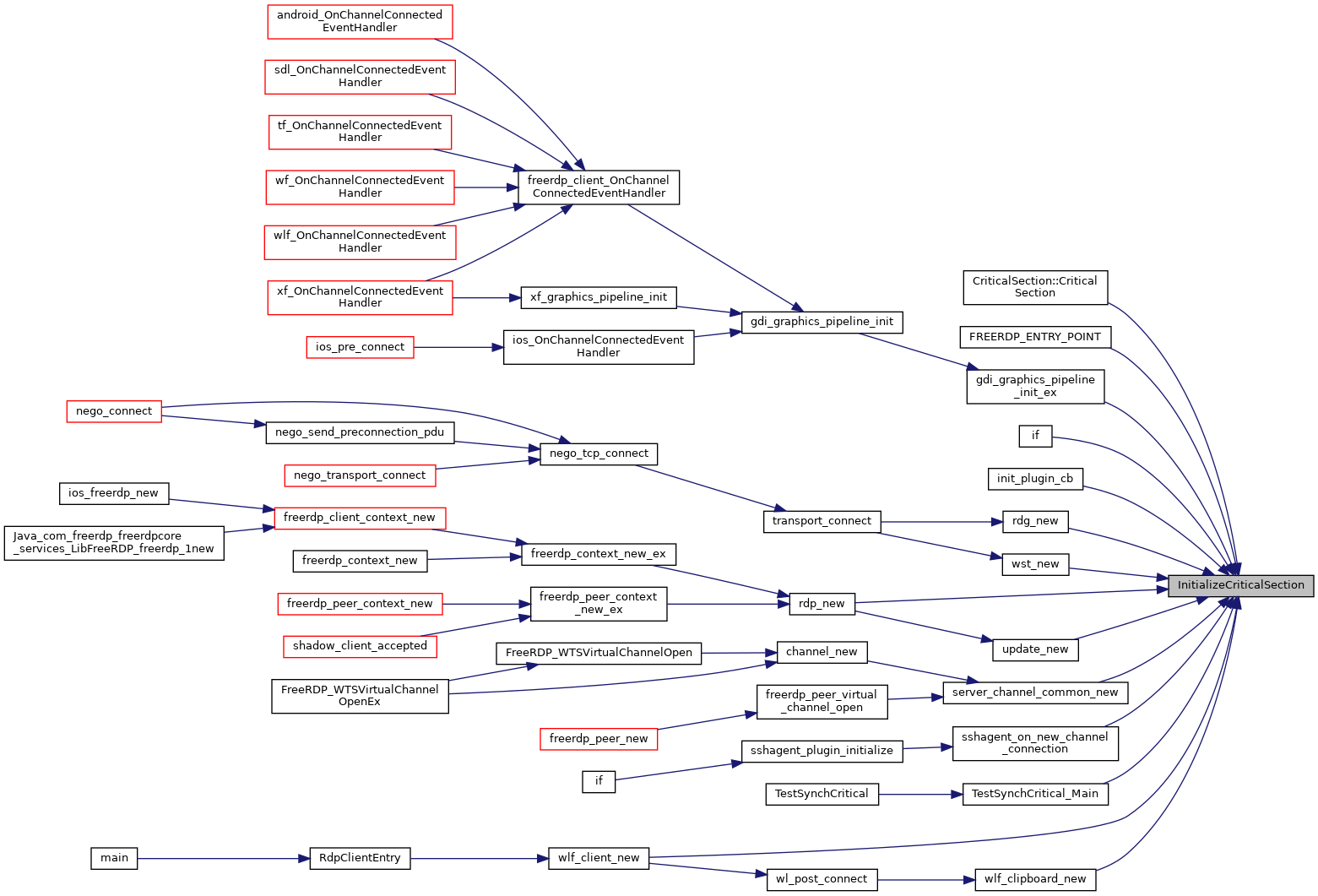
| WINPR_API BOOL InitializeCriticalSectionAndSpinCount | ( | LPCRITICAL_SECTION | lpCriticalSection, |
| DWORD | dwSpinCount | ||
| ) |

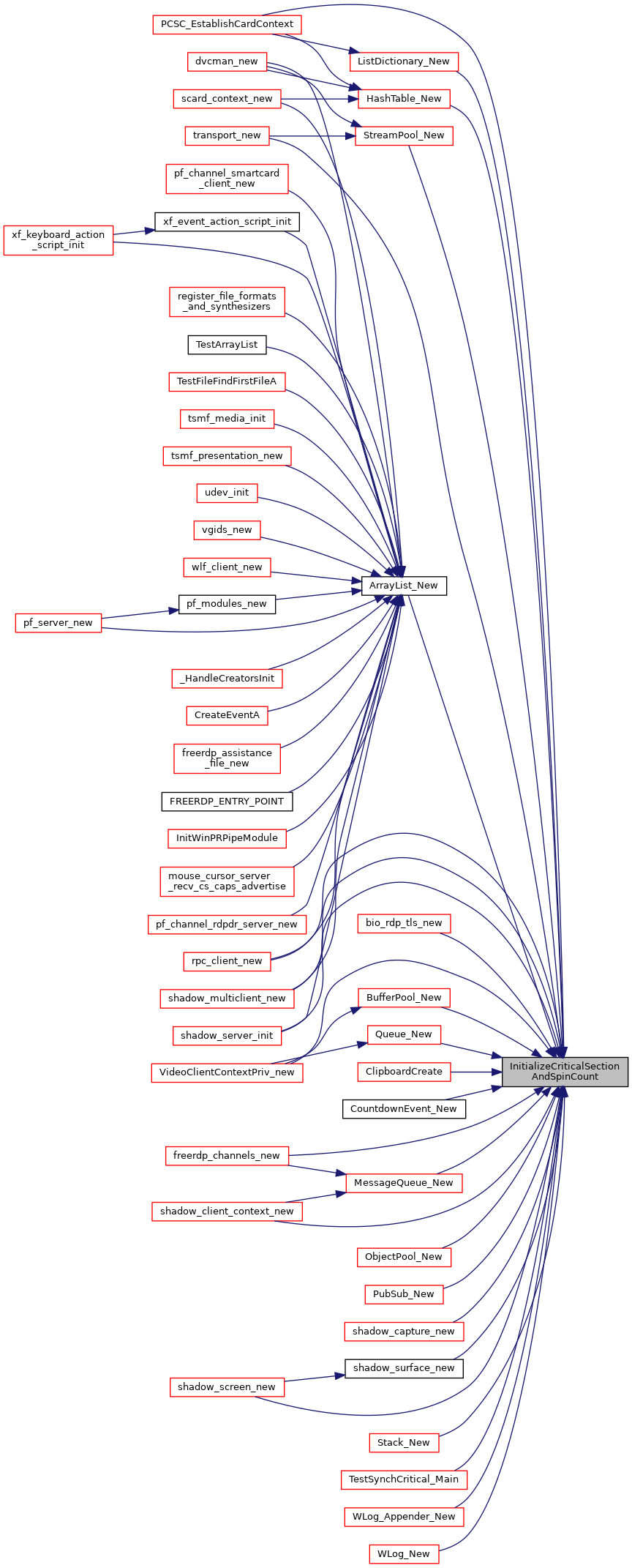
| WINPR_API BOOL InitializeCriticalSectionEx | ( | LPCRITICAL_SECTION | lpCriticalSection, |
| DWORD | dwSpinCount, | ||
| DWORD | Flags | ||
| ) |
See http://msdn.microsoft.com/en-us/library/ff541979(v=vs.85).aspx

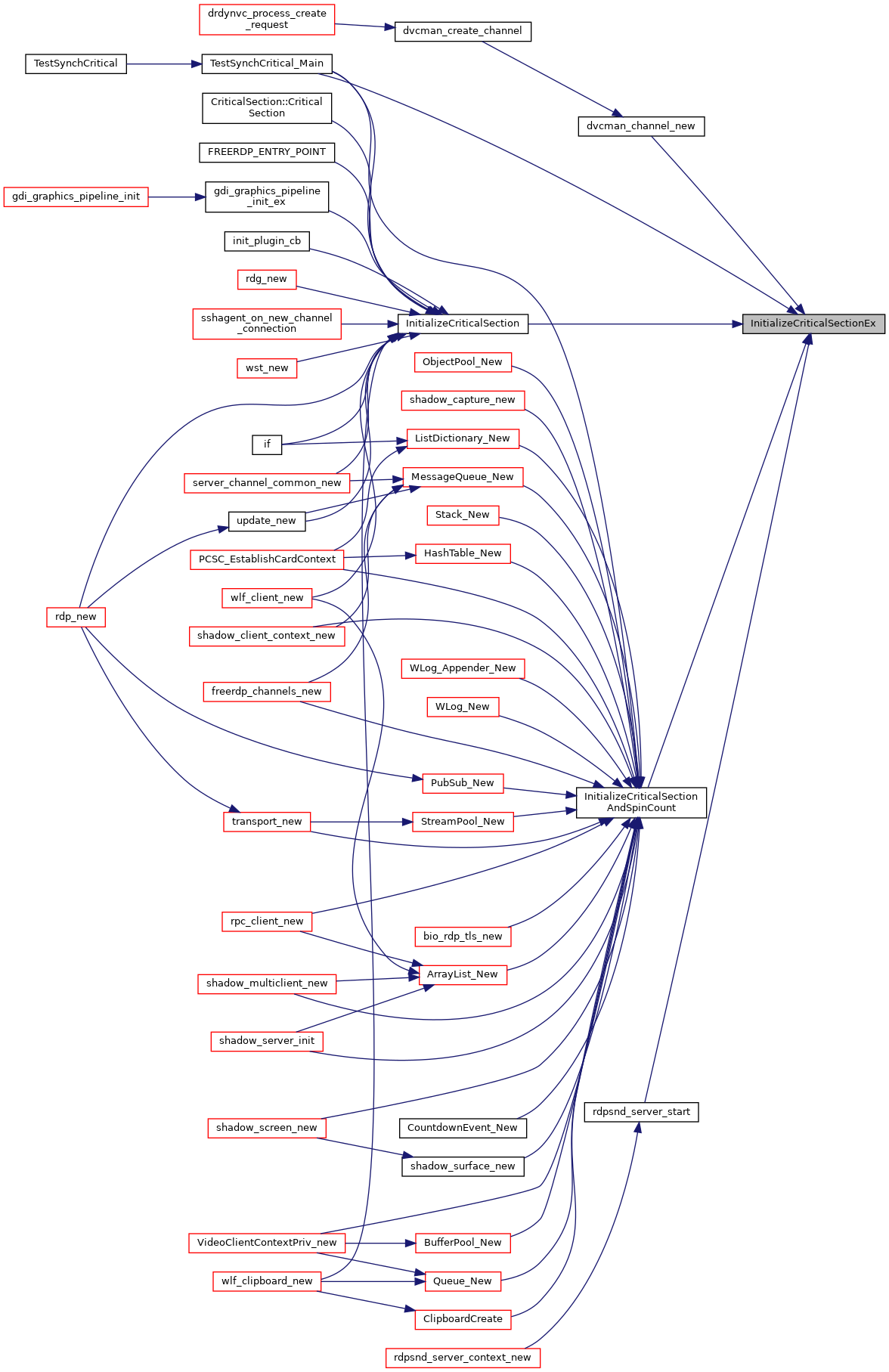
| WINPR_API VOID LeaveCriticalSection | ( | LPCRITICAL_SECTION | lpCriticalSection | ) |

| WINPR_API HANDLE OpenEventA | ( | DWORD | dwDesiredAccess, |
| BOOL | bInheritHandle, | ||
| LPCSTR | lpName | ||
| ) |
| WINPR_API HANDLE OpenEventW | ( | DWORD | dwDesiredAccess, |
| BOOL | bInheritHandle, | ||
| LPCWSTR | lpName | ||
| ) |
| WINPR_API HANDLE OpenMutexA | ( | DWORD | dwDesiredAccess, |
| BOOL | bInheritHandle, | ||
| LPCSTR | lpName | ||
| ) |
| WINPR_API HANDLE OpenMutexW | ( | DWORD | dwDesiredAccess, |
| BOOL | bInheritHandle, | ||
| LPCWSTR | lpName | ||
| ) |
| WINPR_API HANDLE OpenSemaphoreA | ( | DWORD | dwDesiredAccess, |
| BOOL | bInheritHandle, | ||
| LPCSTR | lpName | ||
| ) |
| WINPR_API HANDLE OpenSemaphoreW | ( | DWORD | dwDesiredAccess, |
| BOOL | bInheritHandle, | ||
| LPCWSTR | lpName | ||
| ) |
| WINPR_API HANDLE OpenWaitableTimerA | ( | DWORD | dwDesiredAccess, |
| BOOL | bInheritHandle, | ||
| LPCSTR | lpTimerName | ||
| ) |
| WINPR_API HANDLE OpenWaitableTimerW | ( | DWORD | dwDesiredAccess, |
| BOOL | bInheritHandle, | ||
| LPCWSTR | lpTimerName | ||
| ) |
| WINPR_API BOOL ReleaseMutex | ( | HANDLE | hMutex | ) |

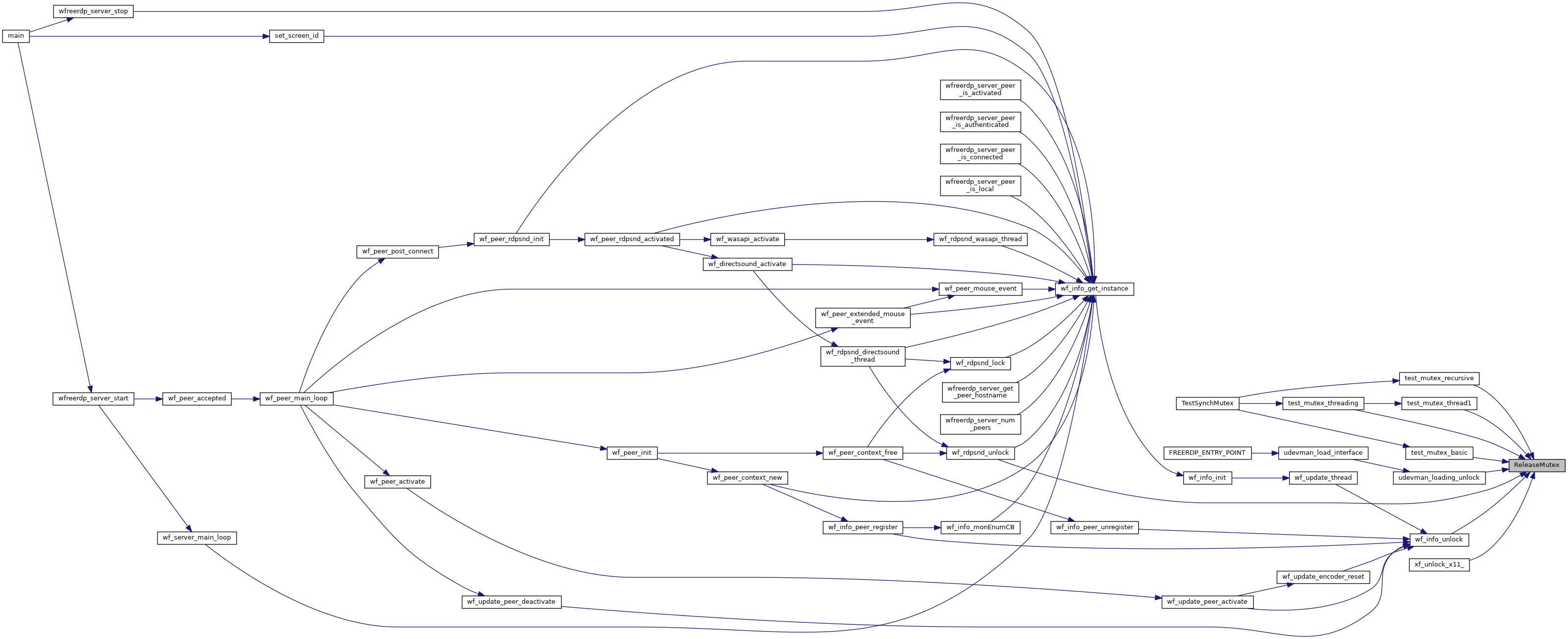
| WINPR_API BOOL ReleaseSemaphore | ( | HANDLE | hSemaphore, |
| LONG | lReleaseCount, | ||
| LPLONG | lpPreviousCount | ||
| ) |


| WINPR_API BOOL ResetEvent | ( | HANDLE | hEvent | ) |

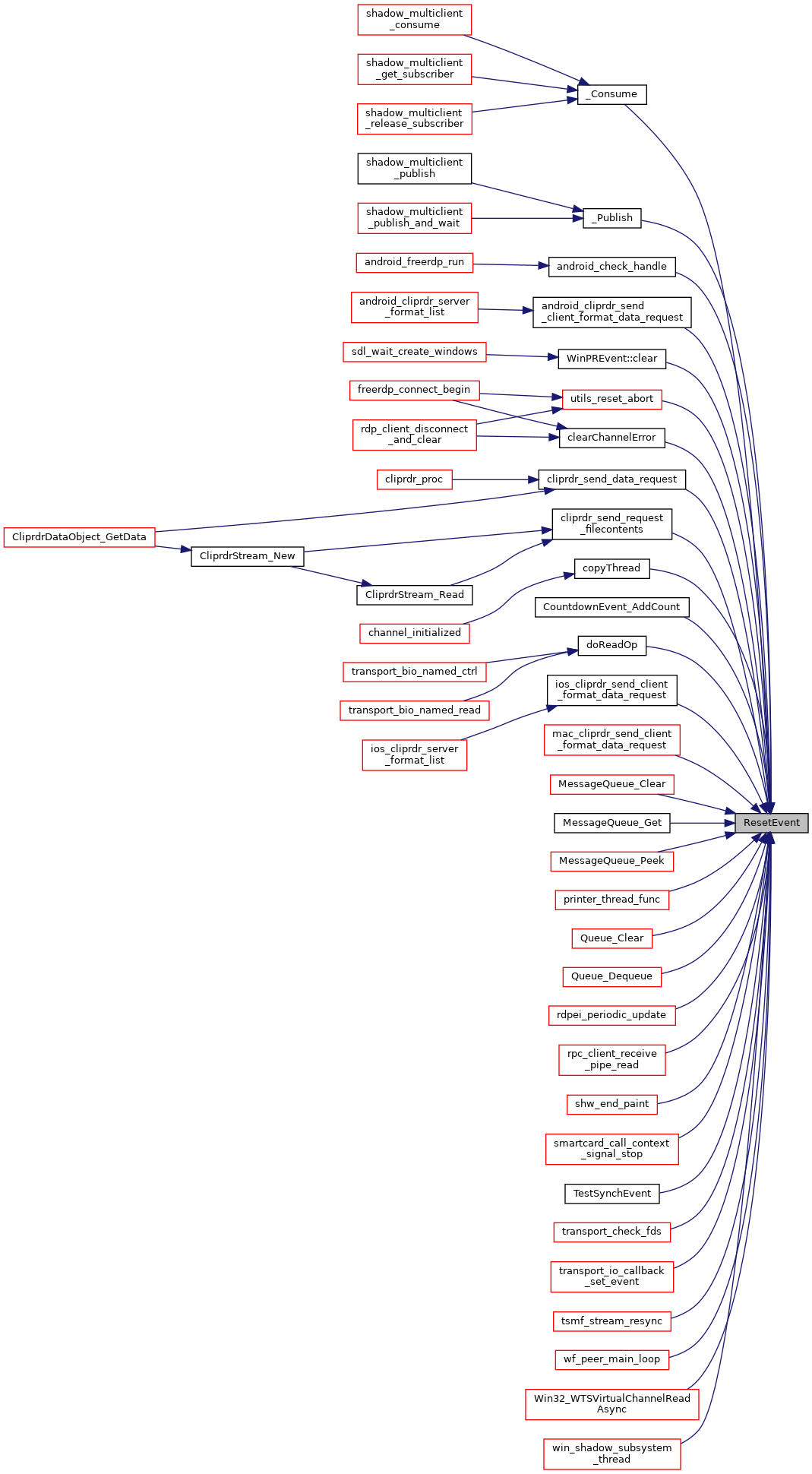
| WINPR_API DWORD SetCriticalSectionSpinCount | ( | LPCRITICAL_SECTION | lpCriticalSection, |
| DWORD | dwSpinCount | ||
| ) |

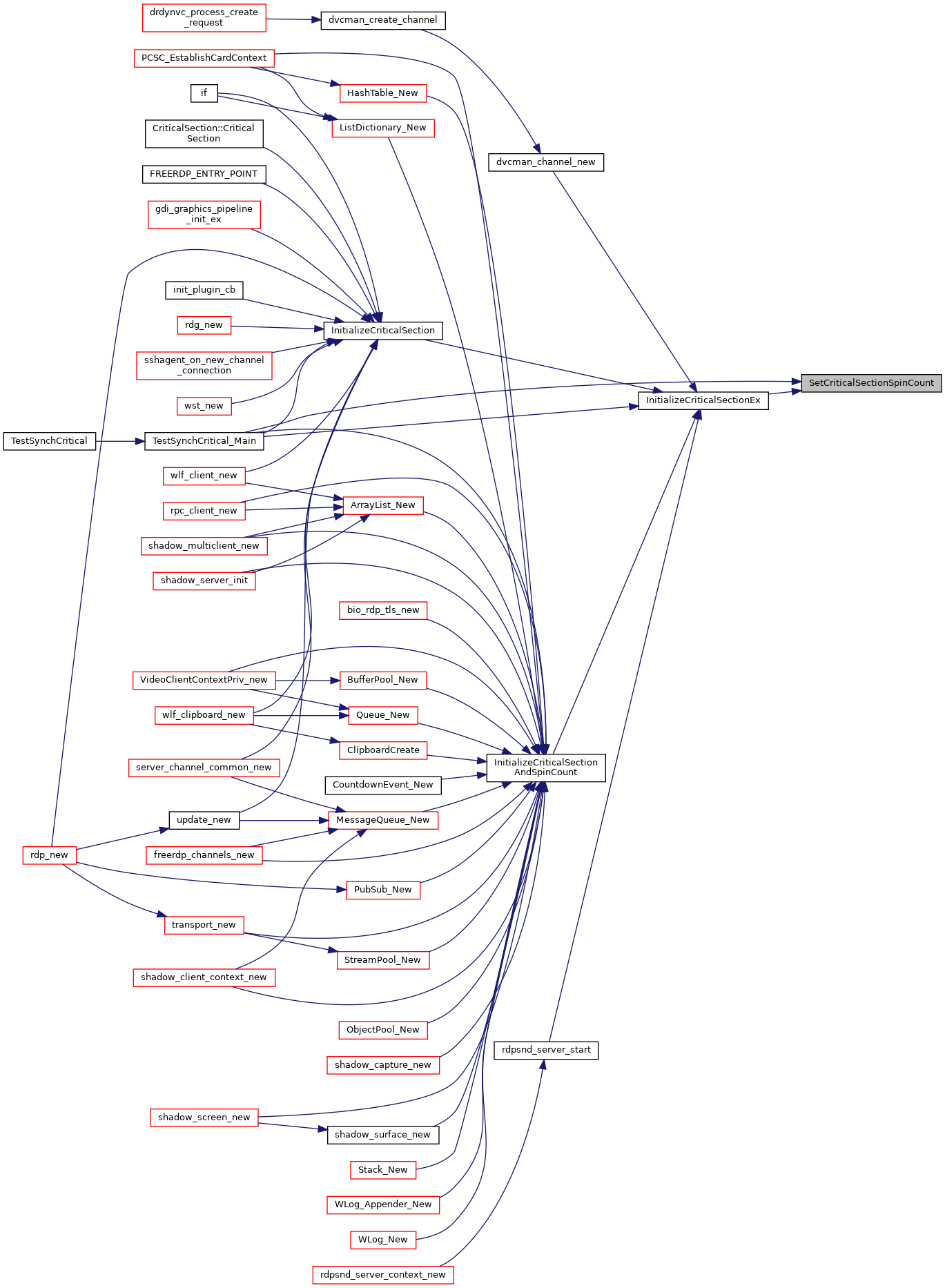
| WINPR_API BOOL SetEvent | ( | HANDLE | hEvent | ) |

| WINPR_API int SetEventFileDescriptor | ( | HANDLE | hEvent, |
| int | FileDescriptor, | ||
| ULONG | mode | ||
| ) |


| WINPR_API BOOL SetWaitableTimer | ( | HANDLE | hTimer, |
| const LARGE_INTEGER * | lpDueTime, | ||
| LONG | lPeriod, | ||
| PTIMERAPCROUTINE | pfnCompletionRoutine, | ||
| LPVOID | lpArgToCompletionRoutine, | ||
| BOOL | fResume | ||
| ) |

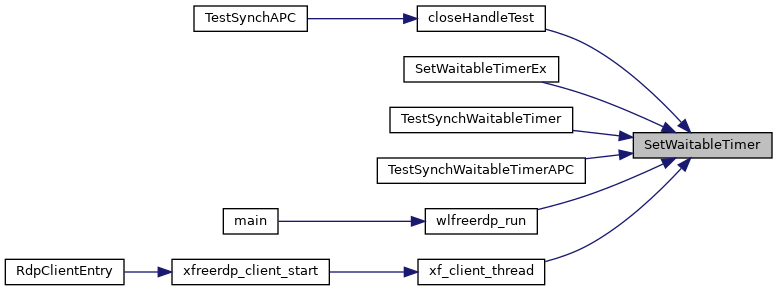
| WINPR_API BOOL SetWaitableTimerEx | ( | HANDLE | hTimer, |
| const LARGE_INTEGER * | lpDueTime, | ||
| LONG | lPeriod, | ||
| PTIMERAPCROUTINE | pfnCompletionRoutine, | ||
| LPVOID | lpArgToCompletionRoutine, | ||
| PREASON_CONTEXT | WakeContext, | ||
| ULONG | TolerableDelay | ||
| ) |

| WINPR_API DWORD SignalObjectAndWait | ( | HANDLE | hObjectToSignal, |
| HANDLE | hObjectToWaitOn, | ||
| DWORD | dwMilliseconds, | ||
| BOOL | bAlertable | ||
| ) |

| WINPR_API VOID Sleep | ( | DWORD | dwMilliseconds | ) |
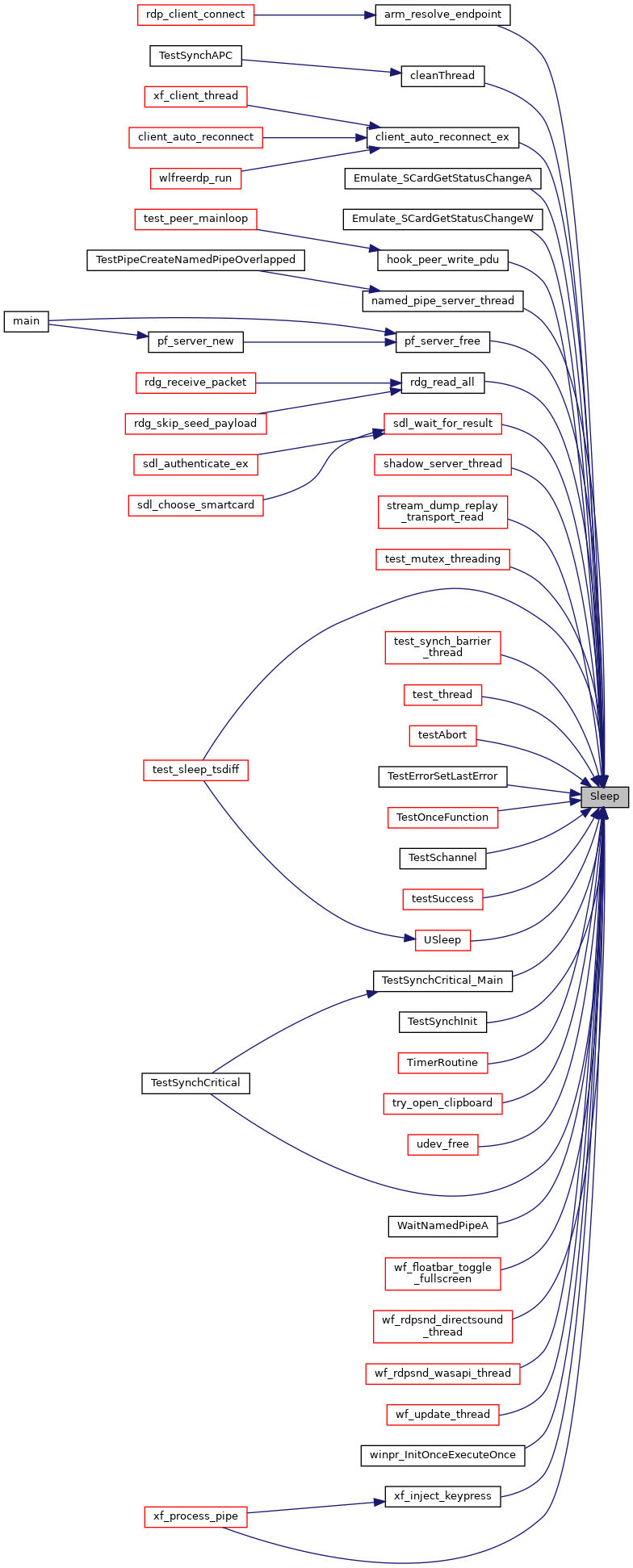
| WINPR_API DWORD SleepEx | ( | DWORD | dwMilliseconds, |
| BOOL | bAlertable | ||
| ) |

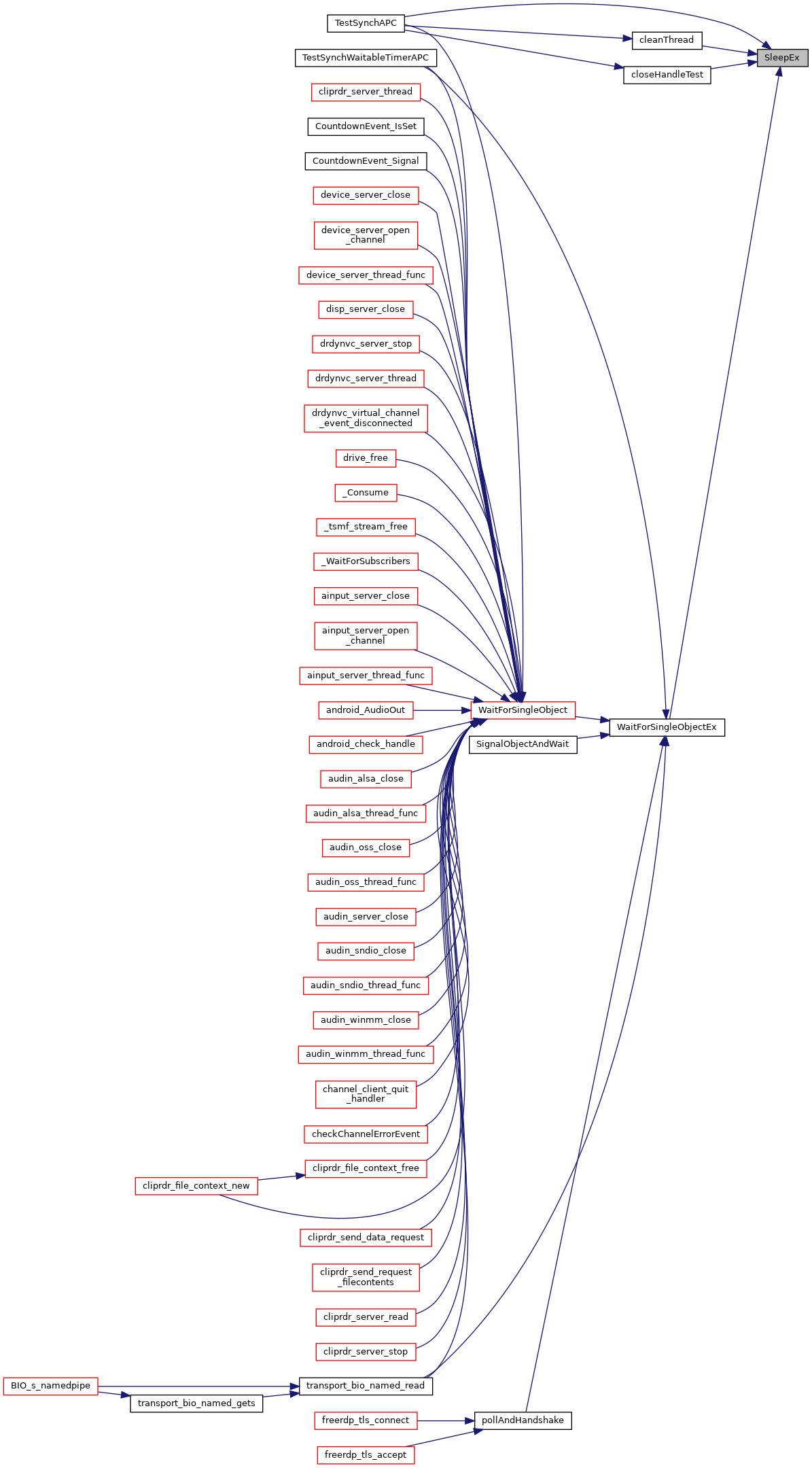
| WINPR_API BOOL TryEnterCriticalSection | ( | LPCRITICAL_SECTION | lpCriticalSection | ) |


| WINPR_API VOID USleep | ( | DWORD | dwMicroseconds | ) |

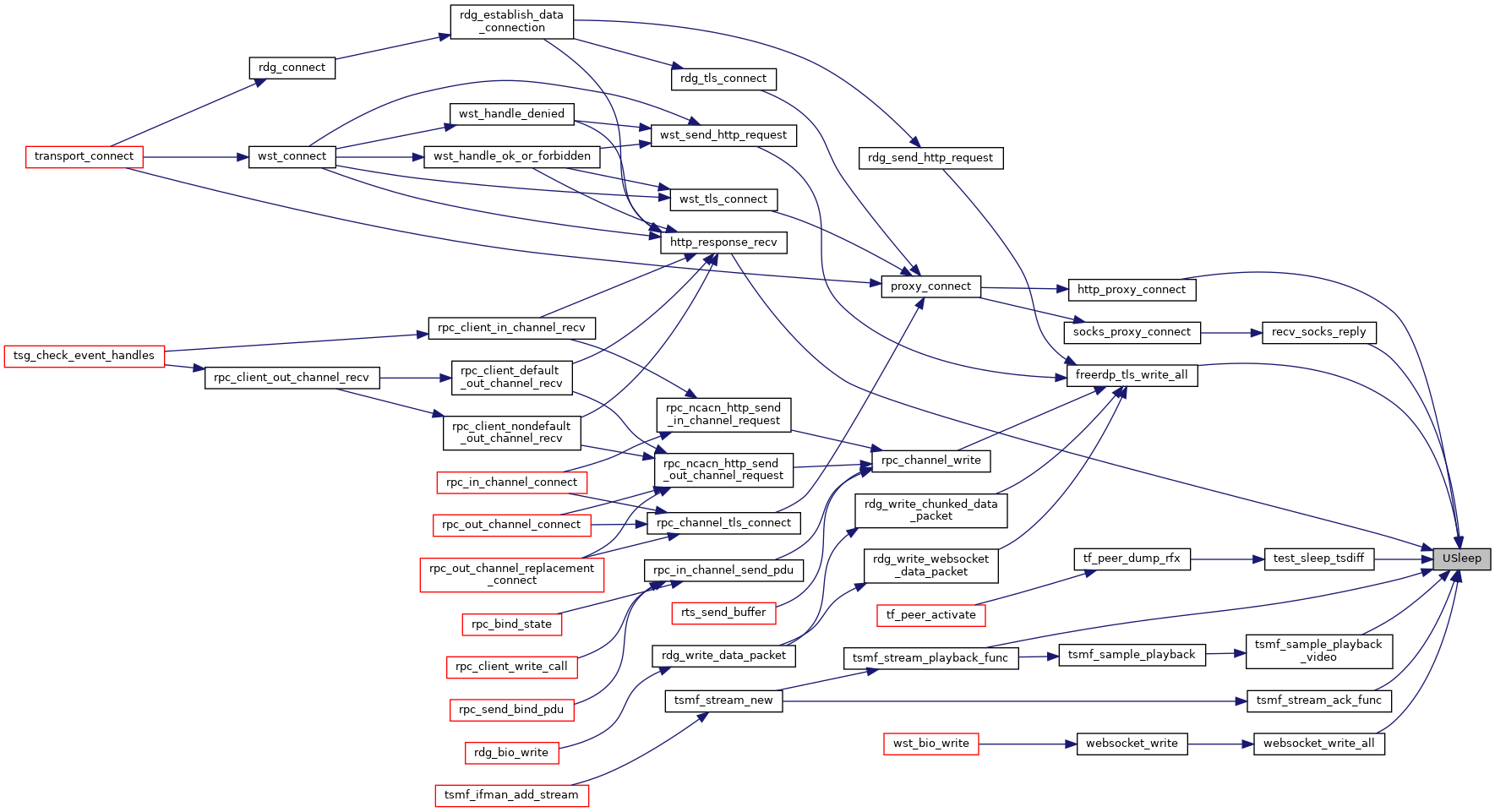
| WINPR_API DWORD WaitForMultipleObjects | ( | DWORD | nCount, |
| const HANDLE * | lpHandles, | ||
| BOOL | bWaitAll, | ||
| DWORD | dwMilliseconds | ||
| ) |
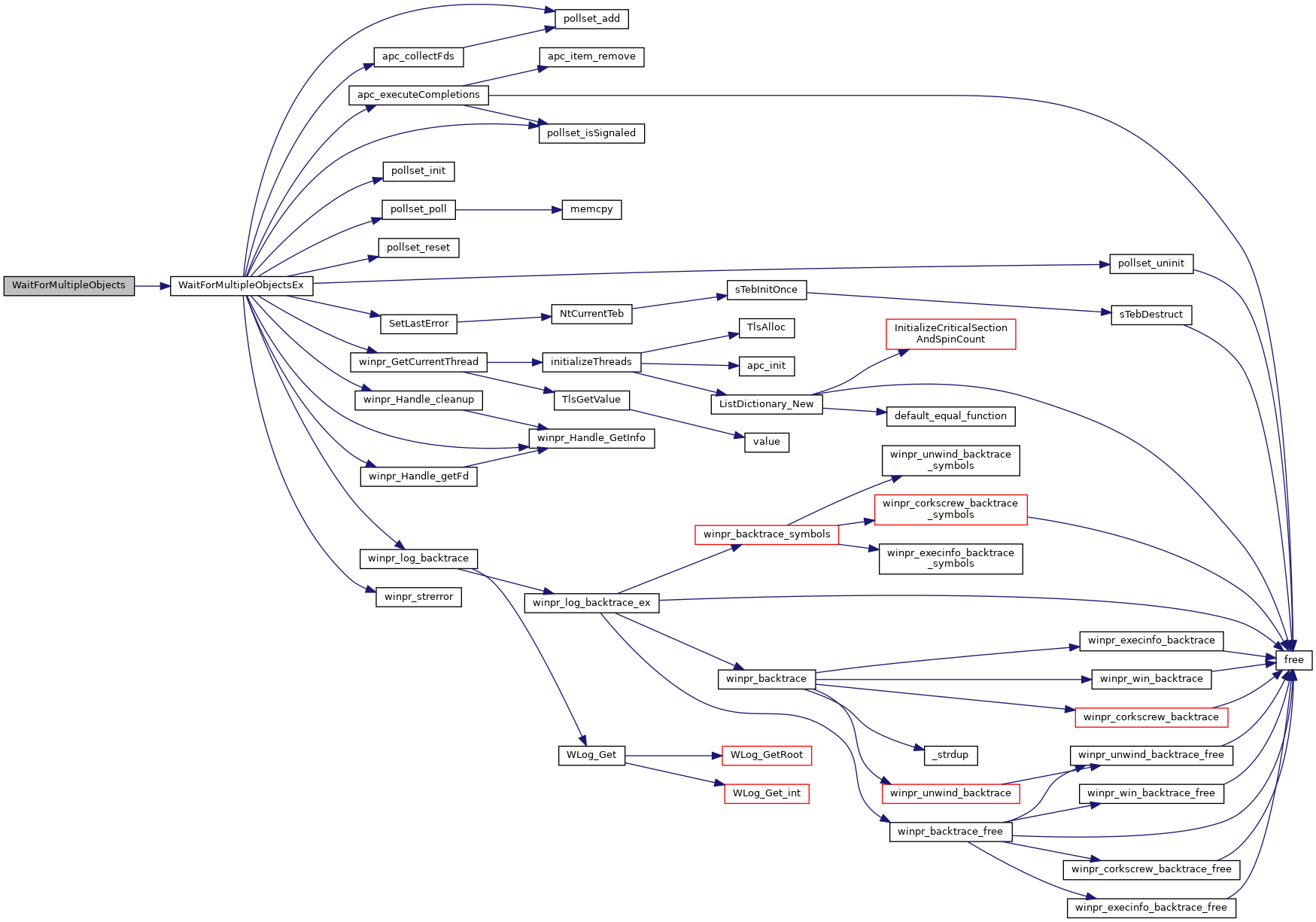
| WINPR_API DWORD WaitForMultipleObjectsEx | ( | DWORD | nCount, |
| const HANDLE * | lpHandles, | ||
| BOOL | bWaitAll, | ||
| DWORD | dwMilliseconds, | ||
| BOOL | bAlertable | ||
| ) |
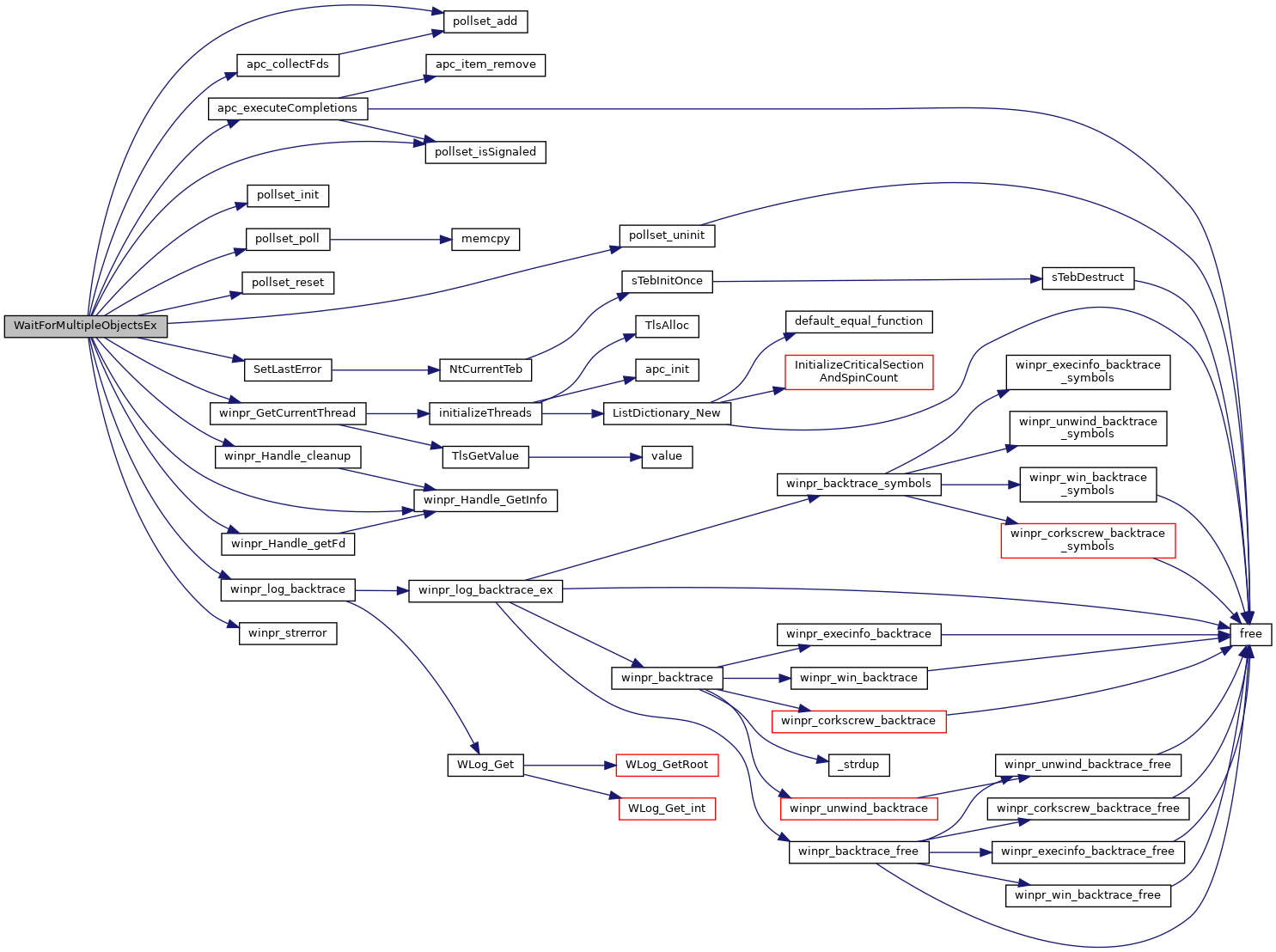

| WINPR_API DWORD WaitForSingleObject | ( | HANDLE | hHandle, |
| DWORD | dwMilliseconds | ||
| ) |

| WINPR_API DWORD WaitForSingleObjectEx | ( | HANDLE | hHandle, |
| DWORD | dwMilliseconds, | ||
| BOOL | bAlertable | ||
| ) |

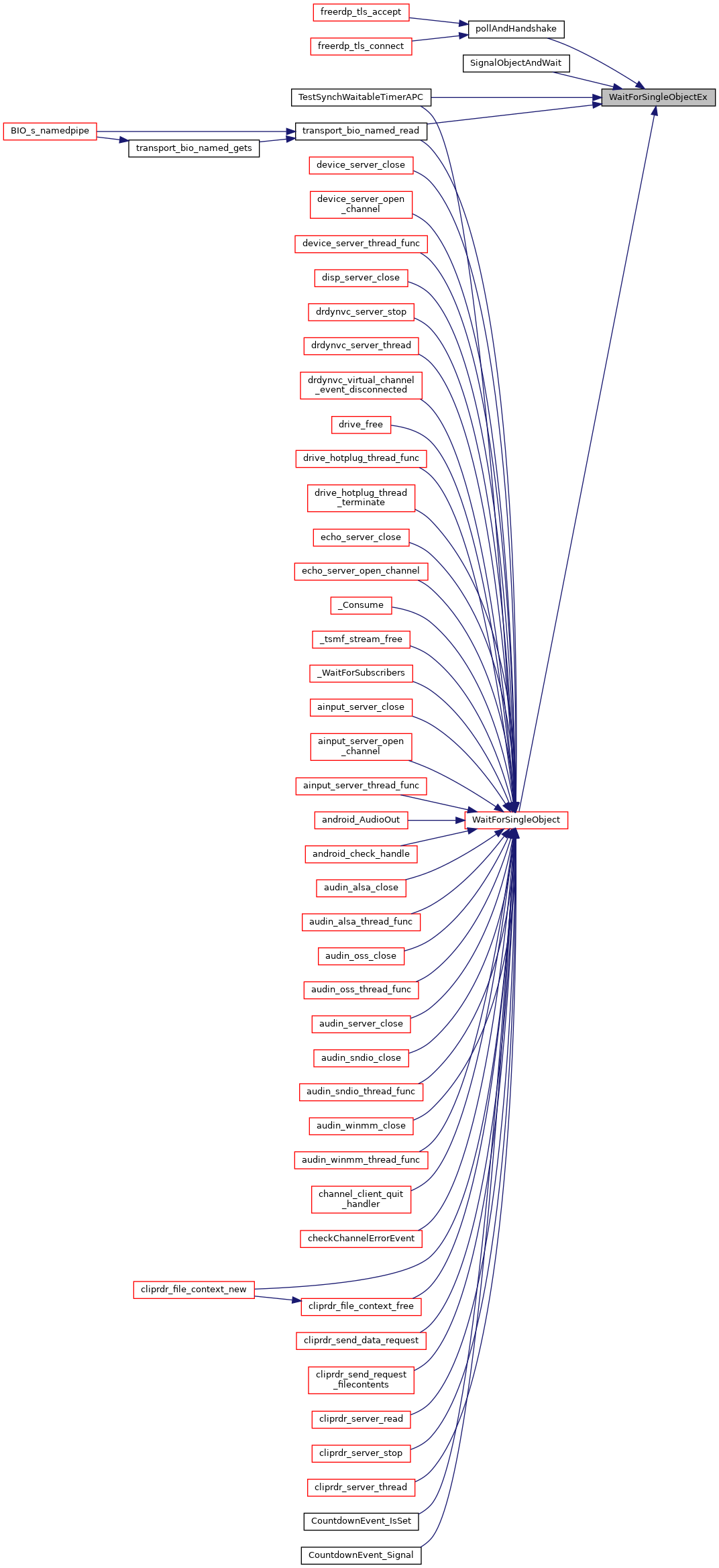
| WINPR_API BOOL WaitOnAddress | ( | VOID volatile * | Address, |
| PVOID | CompareAddress, | ||
| SIZE_T | AddressSize, | ||
| DWORD | dwMilliseconds | ||
| ) |
| WINPR_API VOID WakeByAddressAll | ( | PVOID | Address | ) |
WinPR: Windows Portable Runtime Synchronization Functions
Copyright 2012 Marc-Andre Moreau marcandre.moreau@gmail.com
Licensed under the Apache License, Version 2.0 (the "License"); you may not use this file except in compliance with the License. You may obtain a copy of the License at
http://www.apache.org/licenses/LICENSE-2.0
Unless required by applicable law or agreed to in writing, software distributed under the License is distributed on an "AS IS" BASIS, WITHOUT WARRANTIES OR CONDITIONS OF ANY KIND, either express or implied. See the License for the specific language governing permissions and limitations under the License. WakeByAddressAll WakeByAddressSingle WaitOnAddress
| WINPR_API VOID WakeByAddressSingle | ( | PVOID | Address | ) |
| WINPR_API BOOL WINAPI winpr_DeleteSynchronizationBarrier | ( | LPSYNCHRONIZATION_BARRIER | lpBarrier | ) |
| WINPR_API BOOL WINAPI winpr_EnterSynchronizationBarrier | ( | LPSYNCHRONIZATION_BARRIER | lpBarrier, |
| DWORD | dwFlags | ||
| ) |
| WINPR_API BOOL WINAPI winpr_InitializeSynchronizationBarrier | ( | LPSYNCHRONIZATION_BARRIER | lpBarrier, |
| LONG | lTotalThreads, | ||
| LONG | lSpinCount | ||
| ) |
| WINPR_API BOOL winpr_InitOnceBeginInitialize | ( | LPINIT_ONCE | lpInitOnce, |
| DWORD | dwFlags, | ||
| PBOOL | fPending, | ||
| LPVOID * | lpContext | ||
| ) |
| WINPR_API BOOL winpr_InitOnceComplete | ( | LPINIT_ONCE | lpInitOnce, |
| DWORD | dwFlags, | ||
| LPVOID | lpContext | ||
| ) |
| WINPR_API BOOL winpr_InitOnceExecuteOnce | ( | PINIT_ONCE | InitOnce, |
| PINIT_ONCE_FN | InitFn, | ||
| PVOID | Parameter, | ||
| LPVOID * | Context | ||
| ) |

| WINPR_API VOID winpr_InitOnceInitialize | ( | PINIT_ONCE | InitOnce | ) |